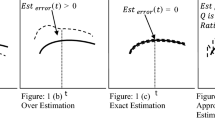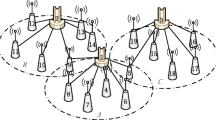Abstract
In wireless multihop networks, communication between two end-nodes is carried out by hopping over multiple wireless links. However, the fact that each node has to transmit not only its own traffic, but also traffic on behalf of other nodes, leads to unfairness among the communication rates of the nodes. Traditional Carrier Sense Multiple Access/Collision Avoidance (CSMA/CA) based media access control does not work satisfactory in a multihop scenario, since an intended target of a communication may be subject to mutual interference imposed by concurrent transmissions from nodes, which cannot directly sense each other, thus causing unfair throughput allocation. Although Time Division Multiple Access (TDMA) seems to be a more promising solution, careful transmission scheduling is needed in order to achieve error-free communication and fairness. Several algorithms may be found in the literature for scheduling TDMA transmissions in wireless multihop networks. Their main goal is to determine the optimal scheduling, in order to increase the capacity and reduce the delay for a given network topology, though they do not consider the traffic requirements of the active flows of the multihop network or fairness issues. In this paper, we propose a joint TDMA scheduling/load balancing algorithm, called Load-Balanced-Fair Flow Vector Scheduling Algorithm (LB-FFVSA). This algorithm schedules the transmissions in a fair manner, in terms of throughput per connection, taking into account the communication requirements of the active flows of the network. Simulation results show that the proposed algorithm achieves improved performance compared to other solutions, not only in terms of fairness, but also in terms of throughput. Moreover, it was proved that when a load balancing technique is used, the performance of the scheduling algorithm is further improved.
Similar content being viewed by others
Explore related subjects
Discover the latest articles, news and stories from top researchers in related subjects.References
Barrett, C. L., & Engelhart, D. C. (2002). Analyzing the short-term fairness of IEEE 802.11 in wireless multi-hop radio networks. In Proceedings of the 10th IEEE international symposium on modeling, analysis, and simulation of computer and telecommunications systems (MASCOTS’02), October 2002, Texas, USA (pp. 137–144).
IEEE, Part 11 (1999). Wireless LAN Medium Access Control (MAC) and Physical Layer (PHY) specifications, IEEE Std 802.11-1999, August 1999.
Xu, S., & Saadawi, T. (2001). Does the IEEE 802.11 MAC protocol work well in multihop wireless ad hoc networks? IEEE Communications Magazine, 39(6), 130–137.
Fang, Z., & Bensaou, B. (2004). Fair bandwidth sharing algorithms based on game theory frameworks for wireless ad-hoc networks. In Proceedings of the 23rd annual joint conference of the IEEE computer and communications societies (Infocom’04), March 2004, Hong Kong (Vol. 2, pp. 1284–1295).
Ephremides, A., & Truong, T. V. (1990). Scheduling broadcast in multihop radio networks. IEEE Transactions on Communications, 38(4), 456–460.
Fattah, H., & Leung, C. (2002). An overview of scheduling algorithms in wireless multimedia networks. IEEE Wireless Communications, 9(5), 76–83.
Han, B., Tso, F. P., Lin, L., & Jia, W. (2006). Performance evaluation of scheduling in IEEE 802.16 based wireless mesh networks. In Proceedings of the 3rd IEEE international conference on mobile adhoc and sensor systems (MASS’06), October 2006, Vancouver, Canada (pp. 789–794).
Wang, G., & Ansari, N. (1997). Optimal broadcast scheduling in packet radio networks using mean field annealing. IEEE Journal on Selected Areas in Communications, 15(2), 250–260.
Peng, Y., Soong, B. H., & Wang, L. (2004). Broadcast scheduling in packet radio networks using mixed tabu-greedy algorithm. Electronics Letters, 40(6), 375–376.
Ngo, Y., & Li, V. O. K. (2003). Centralized broadcast scheduling in packet radio networks via genetic-fix algorithms. IEEE Transactions on Communications, 51(9), 1439–1441.
Chakraborty, G. (2004). Genetic algorithm to solve optimum TDMA transmission schedule in broadcast packet radio networks. IEEE Transactions on Communications, 52(5), 765–777.
Bi, W., Tang, Z., Wang, J., & Cao, Q. (2005). An improved neural network algorithm for broadcast scheduling problem in packet radio. Neural Information Processing-Letters and Reviews, 9(1), 23–29.
Shen, Y.-J., & Wang, M.-S. (2008). Broadcast scheduling in wireless sensor networks using fuzzy Hopfield neural network. Expert Systems with Applications, 34(2), 900–907.
Salcedo-Sanz, S., Busono-Calzon, C., & Figueiral-Vidal, A. R. (2003). A mixed neural-genetic algorithm for the broadcast scheduling problem. IEEE Transactions on Wireless Communications, 2(2), 277–283.
Takefuji, Y., Lee, K., & Aiso, H. (1992). An artificial maximum neural network: a winner-take-all neuron model forcing the state of the system in a solution domain. Biological Cybernetics, 67(3), 243–251.
Vergados, D. D., Vergados, D. J., Douligeris, C., & Tombros, S. L. (2006). QoS-aware TDMA for end-to-end traffic scheduling in ad-hoc networks. IEEE Wireless Communications, 13(5), 68–74.
Yeo, J., Lee, H., & Kim, S. (2002). An efficient broadcast scheduling algorithm for TDMA ad-hoc networks. Computer & Operations Research, 29(13), 1793–1806.
Shi, H., & Wang, L. (2005). Broadcast scheduling in wireless multihop networks using a neural-network-based hybrid algorithm. Neural Networks, 18(5–6), 765–771.
Vergados, D. J., Vergados, D. D., & Douligeris, C. (2005). A new approach for TDMA scheduling in ad-hoc networks. In Proceedings of the 10th IFIP international conference on personal wireless communications (PWC’05), Colmar, France, 25–27 August 2005 (pp. 279–286).
Sgora, A., Vergados, D. J., & Vergados, D. D. (2008). On per-flow fairness and scheduling in wireless multihop networks. In Proceedings of the 13th international workshop on computer aided modeling, analysis and design of communication links and networks (CAMAD 2008), within IEEE international conference on communications (IEEE ICC), Beijing, China, 23–29 May 2008 (pp. 217–221).
Chen, J.-C., Wang, Y.-C., & Chen, J.-T. (2006). A novel broadcast scheduling strategy using factor graphs and the sum-product algorithm. IEEE Transactions on Wireless Communications, 5(6), 1241–1249.
Radunovic, B., & Boudec, J. L. (2004). Rate performance objectives of multihop wireless networks. IEEE Transactions on Mobile Computing, 3(4), 334–349.
ElBatt, T., & Ephremides, A. (2004). Joint scheduling and power control for wireless ad hoc networks. IEEE Transactions on Wireless Communications, 3(1), 74–85.
Appani, P. K., Hammond, J. L., Noneaker, D. L., & Russell, H. B. (2007). An adaptive transmission—schedule protocol for mobile ad-hoc networks. Ad Hoc Networks, 5(2), 254–271.
Lyui, W. P. (1991). Design of a new operational structure for mobile radio networks. Ph.D. Dissertation, Clemson University, August 1991.
He, J., & Pung, H. K. (2005). Fairness of medium access control protocols for multi-hop ad hoc wireless networks. Computer Networks, 48(6), 867–890.
Vaidya, N. H., Bahl, P., & Gupta, S. (2000). Distributed fair scheduling in a wireless LAN. In Proceedings of the ACM MobiCom’00, Boston, MA, USA, Aug. 2000 (pp. 167–178).
Luo, H., Cheng, J., & Lu, S. (2004). Self-coordinating localized fair queueing in wireless ad hoc networks. IEEE Transactions on Mobile Computing, 3(1), 86–98.
Hsieh, H.-Y., & Sivakumar, R. (2001). Improving fairness and throughput in multi-hop wireless network. In LNCS: Vol. 2093. Proceedings of the international conference on networking (ICN 2001), Colmar, France (pp. 569–578).
Vergados, D. J., Manolaraki, M. Y., & Vergados, D. D. (2009). Evaluation of broadcast scheduling algorithms for ad-hoc TDMA networks. In Proceedings of the 1st international conference on wireless communication, vehicular technology, information theory and aerospace & electronic systems technology (Wireless VITAE 2009), Aalborg, Denmark, 17–20 May 2009 (pp. 394–398).
Nandagopal, T., Kim, T.-E., Gao, X., & Bharghavan, V. (2000). Achieving MAC layer fairness in wireless packet networks. In Proceedings of the ACM MobiCom’00, Boston, MA, USA, Aug. 2000 (pp. 87–98).
Jun, J., & Sichitiu, M. L. (2003). Fairness and QoS in multihop wireless networks. In Proceedings of the 58th IEEE vehicular technology conference (VTC03 Fall), Oct. 2003 (Vol. 5, pp. 2936–2940).
Mo, J., & Warland, J. (2000). Fair end-to-end window-based congestion control. IEEE/ACM Transactions on Networking, 8(5), 556–564.
Madhav, V., Marathe, H., Breu, H. B., Ravi, S. S., & Rosenkrantz, D. J. (1995). Simple heuristics for unit disk graphs. Networks, 25(2), 59–68.
Lodi, A., Malaguti, E., & Stier-Moses, N. E. (2010). Efficient and fair routing for mesh networks. Mathematical Programming Series B, 124(1–2), 285–316.
Jain, R. (1991). The art of computer systems performance analysis: techniques for experimental design, measurement, simulation, and modeling. New York: Wiley.
Milic, B., & Malek, M. (2009). NPART—node placement algorithm for realistic topologies in wireless multihop network simulation. In Proceedings of the international conference on simulation tools and techniques for communications, networks and systems & workshops, Rome, Italy, 2–6 March 2009.
Author information
Authors and Affiliations
Corresponding author
Rights and permissions
About this article
Cite this article
Vergados, D.J., Sgora, A., Vergados, D.D. et al. Fair TDMA scheduling in wireless multihop networks. Telecommun Syst 50, 181–198 (2012). https://doi.org/10.1007/s11235-010-9397-9
Published:
Issue Date:
DOI: https://doi.org/10.1007/s11235-010-9397-9




